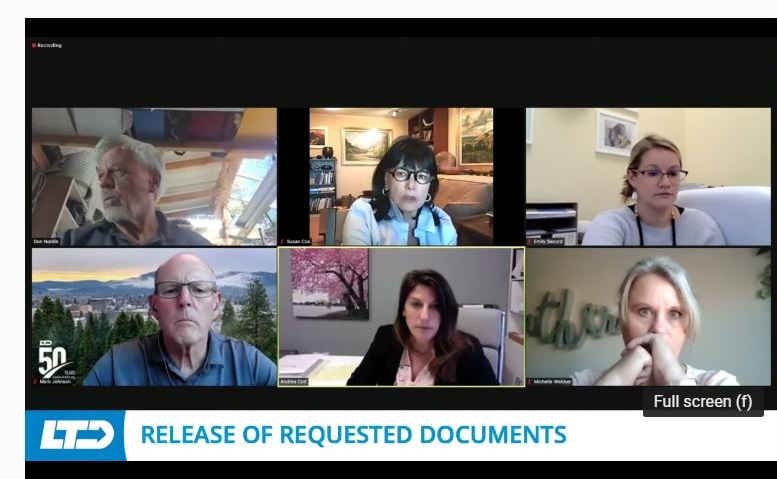LTD releases findings in gender discrimination investigation of ex-board members
6 min read
The LTD Board of Directors released an investigative report into two former board members.
Lane Transit District’s (LTD) Board of Directors voted unanimously during the September 15, 2021 regular board meeting to release the results of an internal investigation to the public.
“The current board members agreed that to live LTD’s values we must maintain transparency with the public and taxpayers by making the report public,” said Caitlin Vargas, the president of LTD’s board of directors. “The information presented is a learning opportunity for each of us. We hope others in the community can benefit from our experience.”
Because the report is a legally protected document, it was given to the board of directors for review in an executive session in late August. Directors determined the best course of action was to vote to determine whether to make the document public.
Thank you for supporting
local civic journalism
LTD released the report on its website Sept. 15, 2021. The full text of the released report is as follows:
LANE TRANSIT DISTRICT INVESTIGATION FINDINGS AND CONCLUSIONS EXECUTIVE SUMMARY
Prepared by: Allyson S. Krueger, Dunn Carney LLP July 19, 2021
- Introduction
This investigation was initiated on May 5, 2021, at the request of the Lane Transit District (LTD) Board of Directors, via LTD’s General Counsel, Kristin Denmark.
The purpose of the investigation was to address the following allegations:
Whether Steven Yett and Joshua Skov, two members of the LTD Board, have engaged in sex or gender discrimination against LTD Staff.
The investigation was conducted pursuant to the LTD Board Policy and Procedures Prohibiting Harassment, Discrimination and Retaliation Policy (LTD Policy).
- Legal Standards
The LTD Policy defines “discrimination” as “treating an employee or another Director negatively or less favorably based on a protected class in a manner that results in harm to the employee or Director.” LTD Policy, Sec. 3. “Protected class” includes gender and sex. LTD Policy, Sec. 9.
The standard for an investigation under the LTD Policy is a preponderance of the evidence, meaning evidence “sufficient … to convince a fact finder or investigator that it is more likely than not that a violation occurred, and, therefore, that the allegation is substantiated.” LTD Policy, Sec. 8.
Additionally, as an employer, LTD also has legal obligations under Title VII of the Civil Rights Act of 1964, together with its state counterpart, to provide a workplace for its employees free from discrimination based on an individual’s protected class status. Federal and Oregon law both protect employees from discrimination based on their sex or gender.
- Investigation Process
Documents and recordings of numerous LTD public and non-public meetings were reviewed. Zoom interviews were conducted with seven LTD staff members and seven LTD board members. Following interviews, some staff members and board members provided additional information for consideration. - Summary of Factual and Legal Conclusions
Based on the interviews and other materials reviewed during the course of the investigation, I am unable to conclude that LTD staff members have been treated differently by Yett and Skov due to any protected class status.
Although I find that the complainants reports of concerns about the behavior of Yett and Skov to be credible, and I did not discern any motivation to fabricate allegations, there is simply not enough evidence to conclude that it is more likely than not that Yett and Skov have engaged in unlawful discrimination or a violation of LTD Policy.
However, several complainants and interviewees noted communication issues, and a certain level of Board dysfunction involving Skov, Yett, and to a lesser extent Emily Secord, on one hand and the General Manager and staff on the other. Until these issues are addressed and dealt with it will likely continue to have a negative impact on the relationships between these Board members and the General Manager and staff, and it will continue to impact how the General Manager and staff perform their job duties. The Board should consider taking steps to address these issues. I’ve included a summary of these issues for further attention below.
- Summary of Concerns for Further Review/Action
(a.) Yett, Skov, and to a lesser extent, Secord, are at times not fully prepared to participate in Board or committee meetings because they either have not reviewed the materials provided by staff, or they have not asked follow up questions of staff in advance of such meetings.
This has led to inefficient committee or board meetings where information already provided is sought again. For example, Yett is on the Contracts Committee but failed to review the April meeting materials related to the Gloria Gallardo DBA DBS Consulting (DBS Consulting) contract in advance and asked no questions at the meeting. Then when the contract came up on the April Board meeting’s consent calendar, Yett had additional unanswered questions which resulted in an uncomfortable and public interaction between Yett, Skov, and staff (in particular Assistant General Manager Mark Johnson). Similarly, Skov did not watch the April Contracts Committee meeting or ask for any information about this same contract ahead of the Board meeting, and was then unwilling to accept that the Contracts Committee had voted to move the DBS Consulting contract to the consent calendar. Basically, Skov wanted to start the discussion over which led to a delay in approving the contract and also negatively contributed to the public interaction referenced above.
One witness commented that committee work “oozes” into the Board meetings with “everyone doing everything,” instead of a significant portion of the work of the Board being accomplished in committee meetings and the full Board voting on the committee recommendations instead of the Board doing a full review of issues addressed in committee.
(b.) Yett, Skov, and to a lesser extent, Secord, ask questions in public meetings that communicate a level of distrust of LTD executive staff. For instance, asking what specific checks in small amounts are for as though the board member has a concern about fraud or theft. Or asking why several checks are written to the same payee. Other questions will be asked with the preface “for the sake of transparency” as though staff or the agency is not being transparent. Complainants and witnesses raised a concern that these type of questions may lead the public to distrust agency staff and leadership.
Additionally, questions will also be asked in public meetings that cannot immediately be answered by staff, thereby placing staff in an uncomfortable position and resulting in a delay in addressing issues. The message that gets communicated by the above behavior is that these board members do not trust the staff.
(c.) Yett, Skov, and to a less extent, Secord, appear overly interested in operational details.
Witnesses cited questions and discussions in Board meetings that indicated to staff that their expertise is not being respected. Requesting information about individual checks, for instance, as described above. Also, the significant questioning and requests for information around renewing the DBS Consulting contract was cited as an example of the Board engaging in an unusual level of operational oversight; again, witnesses felt this demonstrated a lack of trust in staff.
(d.) Complainants and witnesses cited other instances demonstrating a lack of trust in the General Manager or staff. For instance, several complainants and staff commented that early in his tenure on the Board Yett requested LTD contracts and supporting documentation going back several years. A great deal of staff effort went into providing the information to him, but there was never any follow up whatsoever.
(e.) Nearly every complainant and several of the witnesses commented on how the General Manager’s review process, carried out via a series of public meetings during the last quarter of 2020 and the first quarter of 2021, made them very uncomfortable and even embarrassed for the General Manager, the Board, and the agency. I reviewed portions of these recorded meetings and agree that the process was rather unstructured, disorganized, and felt counterproductive.
Should you have additional questions, or if you would like more information about any of the above, please let me know.





